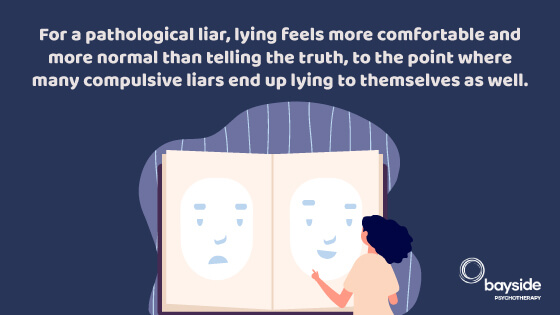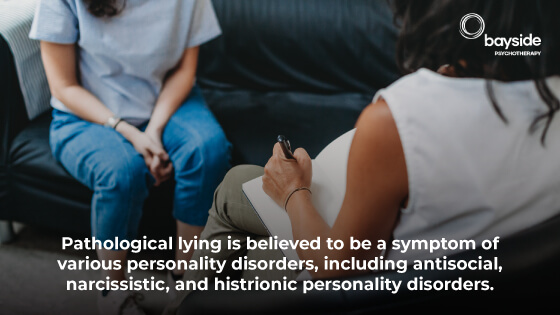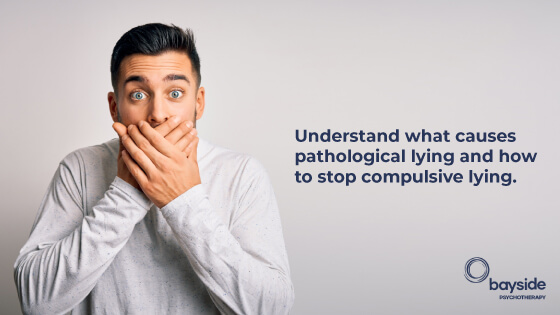Can a compulsive liar change?
You know the truth. And you know that deep intimacy and self-esteem are impossible without it. So how did the occasional little white lie become a habit, a strategy?
More importantly, how do you turn it around? How do you stop lying habitually, regain your sense of self-worth, and return to a life of trusting, secure relationships?
The first step in recovery is to understand it. To get to the bottom of why you do it. The second step is to really want to change. Then seek professional assistance. Note that we do not work with forensic populations.
Why do people become compulsive liars?
This compulsion usually starts during childhood, often as a way of coping with difficult feelings of shame or anxiety. Growing up in an emotionally unsafe environment (where certain thoughts and feelings are considered ‘wrong’) can lead to habitual lying. And there can be other reasons as well. Many times the cause is opaque, at first.
Eventually it becomes an attempt to avoid difficulties, even though new difficulties result from habitual lying. In some cases, individuals believe deep down that their true self is flawed and not good enough. They feel they need to lie to win the acceptance and approval of people they value.
Others do it to carve out a barrier of psychological space between themselves and the other. This is often seen in people who feel smothered or otherwise controlled.
Whatever the reason, over time, lying can become addictive. A habit. It feels more comfortable and more normal than telling the truth, to the point where many compulsive liars end up lying to themselves as well.
Unfortunately, without therapy, compulsive lying can last a lifetime.

Dealing with lying in a relationship
While lying may have seemed to make life easier in the past, you’ve probably already realised that it can have a significant negative impact on your work, on loved ones, friends and colleagues. Even on strangers! It can ruin your career, tarnish your reputation and destroy relationships.

Deep intimacy requires trust. Friendships require trust. Fruitful working relationships require trust. Without trust, everything you say is called into question and every important person in your life feels betrayed and uncertain about your true intentions and feelings.
Just as importantly, your habit may be preventing you from getting what you need from your relationships. Many people who lie frequently are chronic people-pleasers who bury resentment and don’t feel capable of asking for what they want and need. Since their partners, friends and colleagues don’t even know they’re unhappy, there’s virtually no chance of improvement.
There’s also some evidence indicating that this condition creates personal distress even when the liar ‘gets away with it’. It can make it harder to connect with other people and feel empathy.
Plus there’s the constant anxiety about getting caught in a lie. The pressure to remember your lies, and to manage the snowball effect of covering up lies with more lies, can lead you to feel guilty, fake, worthless and powerless to change.
But it doesn’t have to be this way. Unravelling the interior tangle of trauma and denial and ingrained behaviour can be tricky on your own. But you can get help to address your compulsive lying and set your life back on track. And the earlier you start, the better.
How to stop compulsive lying
Admitting that you have a problem is the first, courageous step towards recovery. Seeking professional treatment for pathological or compulsive lying is the second.
Our psychotherapy, counselling or hypnotherapy services are available to help you identify and address the underlying causes of your addiction, so you can work towards the goal of stopping altogether.
As you begin to gain insight into the triggers and patterns of your compulsive lying, you’ll be better equipped to anticipate and control it. You may notice an improvement in your relationships and a significant increase in your self confidence. Not the fake kind of confidence that lying temporarily provides, but an authentic feeling of self-worth.
Psychotherapy involves deep, honest self enquiry designed to transform the inner conflicts that give rise to excessive lying in the first place. It requires commitment and the courage to confront painful, long-suppressed emotions. But the more thorough the therapy, the more likely you are to achieve lasting results.
What can you expect from your compulsive liar treatment?
We offer online and in-clinic counselling, psychotherapy or hypnotherapy.

Regardless of which you choose, we provide a safe, supportive, accepting environment, without shame or judgement. Compulsive lying is not something you should feel ashamed of or try to hide; it’s just a disorder that needs treatment — ideally from someone who can provide an objective and informed perspective without sacrificing empathy for the real pain a lying addiction can cause.
During your first session, you’ll be able to discuss your problem in confidence, ask any questions, and decide if your psychotherapist is the right fit for you. This session will give us an initial insight into the issues involved in your case, and help us understand what you want to achieve.
After the first session, we’ll work with you to create a tailored treatment plan if we agree to work together long term. We may propose short term methods such as hypnotherapy to help change your habitual patterns of thoughts and responses. But every case is different. We may alternatively recommend mindfulness therapy, cognitive behavioural therapy (CBT) or (Neuro-linguistic programming) NLP, depending on the therapist you engage, to create a program tailored to your individual needs.
Importantly, we don’t just treat your symptoms; we aim to help you discover the causes of your compulsive lying, so you can live a more satisfying, fulfilling and authentic life.
How long will compulsive liar treatment take?

Some clients occasionally report that their treatment started showing results within the first few sessions. However, almost every compulsive liar that is amenable to insight oriented psychotherapy, requires longer term psychotherapy for meaningful change being at least one session a week over several months or years. Discuss suitability for psychotherapy during the initial sessions.
Although you may begin to experience improvements quite quickly, our therapy is not a quick-fix solution. We believe it’s important to hunt down the underlying causes for problematic behaviours so you can live a more satisfying, fulfilling and authentic life.
We’re committed to helping you, but you need to be committed too. Everyone’s circumstances and reactions to treatment are different but your progress also relies heavily on your willingness to participate in therapy.
Need help being matched with a therapist for compulsive liar treatment?
Call Bayside Psychotherapy on (03) 9557 9113 if you have questions, use our contact form, or book online if you are ready to commence treatment.
Searching for a recommended therapist for lying help?

Note: Whilst we will do our best to assist you, we rely on our clients’ full commitment to and participation in the treatment process to optimise results. Although some of our therapists work with people presenting with this condition, no guarantees of any outcomes can be made.
Frequently Asked Questions
Is compulsive lying a symptom of depression?
Whilst there has been little research into whether compulsive lying may be a symptom of depression, the true causes of compulsive lying are unknown.
For instance, it has been reported anecdotally as being associated with several other disorders such as Bipolar Disorder; Attention Deficit Hyperactivity Disorder (ADHD); Impulse control issues; Substance dependency; Borderline personality; or Narcissistic personality. All of these illnesses can involve depression as well as compulsive lying, yet to state compulsive lying is a symptom of depression would be incorrect - they are simply two separate symptoms of an underlying conflict unique to an individual. Of not, not every compulsive liar has an underlying mental illness as such. Figuring out where the symptom fits into a persons life and what function it intends to serve can be revealing. It is a case by case consideration.
Why Do Pathological Liars Lie?
A core feature of a pathological liar is that they generally have no obvious motivation to lie. Because of this, it can make it frustrating or even difficult to know what to do if you think you’ve met one. The function and purpose may be unconscious and ironically it required honestly and commitment in therapy to get to the trues behind the temptation to lie. Given commitment and honestly is needed in therapy for treatment to be successful, not all people experiencing pathological lying will benefit from psychotherapy or even counselling. An initial assessment session is indicated to determine motivation and appropriateness of therapy. That said, there is always a purpose behind the lies unique to the individual.
How to Recognize Pathological Lying
It is often possible to tell if and why someone may have told us a lie. This is usually an incorrect or false statement they make to (consciously) benefit themselves, such as to avoid stress, embarrassment, or anxiety. Unconsciously however the person lying may struggle with anger under the surface and lie in order to create conflict (he or she consciously avoids conflict while unconsciously orchestrating it by way of setting themselves up to be caught out lying). This is typical but not universal. Every case is different.
Whilst this may be in the instance of a simple white lie, there are a few tell-tale signs to help recognise a pathological liar.
For example, a pathological liar may lie for no obvious reason, with lies that do not seem to impact or benefit them in any way. Their lies seem to have no clear benefit, which can be particularly frustrating because the person lying doesn’t seem to gain anything (obvious) from their lies except to distort or manipulate the truth. In addition, the lies they weave are often theatrical, complex, and extremely thorough.
Pathological liars tend to be great storytellers and, even though their lies are quite obviously over-the-top, they may be very convincing – leading you to doubt yourself and what you believe to be the truth. A pathological liar may often show themselves to be the hero or victim in their lies, to invoke either awe or pity in the listener. Along with this, pathological liars sometimes seem to believe the lies they tell, weaving stories that fall between obvious lying and delusion, in simpler terms - they seem to believe their own lies and become more convincing.
How to Deal With a Pathological Liar
It can be problematic to determine how to deal with a pathological liar, especially since their defensive manoeuvres of denial, minimisation, projection, displacement, lashing out or gaslighting may be activated following confrontation. There are a few coping methods for dealing with a pathological liar, such as not losing your temper with them - it’s important not to let your anger get the better of you.
- Remember, it’s not about you - it’s difficult not to take it personally when lied to but remember the person may be experiencing an underlying disorder.
- Be kind and supportive, but firm - remind them that you value them for who they are and that they don’t need to impress you with their lies. But encourage them to consider therapy if they recognise a pattern and are ready to change.
- Don’t engage or encourage them – you may choose to question what they’re saying, but advise them that you don’t wish to continue the conversation if they are lying. Sometimes setting a clear boundary and limit is crucial to preserve sanity in a relationship depending on the circumstances.
- Suggest help - suggest that they consider professional help, without judging or shaming them, reminding them that your suggestion comes from a place of concern and care for their well-being. It is ultimately their choice however and if they maintain denial in the face of evidence and otherwise to refuse treatment, there is little therapy can provide until they begin to take responsibility.
Reception Phone Hours
- – Monday 8:30am to 5:30pm
- – Tuesday 8:30am to 5:30pm
- – Wednesday 8:30am to 5:30pm
- – Thursday 8:30am to 5:30pm
- – Friday 8:30am to 5:30pm
Closed on public holidays
Choose your own date and time for an online or in-clinic session
Therapist Hours
- – Monday 8:00am to 8:00pm
- – Tuesday 8:30am to 8:00pm
- – Wednesday 8:30am to 8:00pm
- – Thursday 8:30am to 8:00pm
- – Friday 8:30am to 8:00pm
- – Saturday 8:00am to 6:00pm
Closed on public holidays








